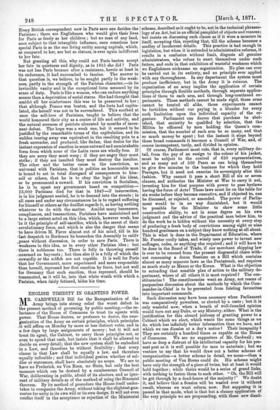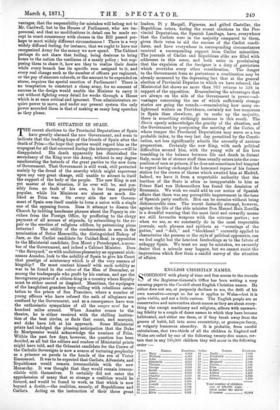ENGLISH TIMIDITY GRANTING POWER.
MR. CARDWELL'S Bill for the Reorganization of the Army brings into strong relief the worst defect in the present method of governing by public meeting,—the re- luctance of the House of Commons to trust its agents with power. That House desires, or professes to desire, the reor- ganization of the Army on certain principles, which principles -it will affirm on Monday by more or less distinct votes, and in a few days by large assignments of money ; but it will not -trust its agent, the Cabinet, to carry those principles out, or even to spend that cash, but insists that it shall be allowed to decide on every detail; that the new system shall be embodied in a Law, and therefore be without flexibility ; that every 'clause in that Law shall be equally a law, and therefore -equally inflexible ; and that individual genius, whether of sol- dier or statesman, shall have absolutely no scope. We are to lave no Frederick, no Von Boon, no Stein, but only the best measure which can be devised by a cumbersome Council of War, deliberating in public, afraid of its electors, and as igno- rant of military details as of the method of using the Binomial theorem. By its method of procedure the House itself under- takes to reorganize the Army, without taking the slightest gua- rantee for unity in its own will or its own design. It will not even confine itself to the acceptance or rejection of the Ministerial
scheme, described as it ought to be, not in the technical phraseo- logy of an Act, but in an official pamphlet of objects and reasons; but insists on discussing each clause as if it were a measure in itself, accepting this, rejecting that, till the scheme becomes a medley of incoherent details. This practice is bad enough in legislation, but when it is extended to administrative reforms, it results in a confusion without limit, disgusts all genuine administrators, who refuse to exert themselves under such fetters, and ends in that exhibition of wasteful weakness which we Englishmen nickname an organization. No plan can ever be carried out in its entirety, and no principle ever applied with any thoroughness. In any department the system must produce inefficiency, but in the Army it is ruinous. The organization of an army implies the application of certain principles through flexible methods, through separate applica- tions of them to each arm, and through long-continued ex- periments. Those methods cannot be made rigid, those arms cannot be treated all alike, those experiments cannot be forbidden without our paying in a blunder for every such limitation upon the individual capacity of the or- ganizer. Parliament can decree that purchase be abol- ished, that seniority be qualified by selection, that the Militia be officered by men holding the Queen's com- mission, that the number of each arm be so many, and that so much money be spent ; but the instant it steps beyond those broad commands it becomes a Council of War, and, of course incompetent, tardy, and divided in opinion.
Of course, Parliament must rule, that is, every military de- tail, from the pay of an ensign to the colour of his jacket, must be subject to the control of 650 representatives, and as many out of 500 Peers as can bring themselves to give five minutes to the business for which they hold Peerages, but it need not exercise its sovereignty after this fashion. Why cannot it pass a short Bill of six or seven clauses, and authorize the Minister at War to carry it oat, investing him for that purpose with power to pass byelaws having the force of Acts? Those laws must lie on the table for six weeks before they become executive, and if objected to, can be discussed, or rejected, or amended. The power of Parlia- ment would be in no way diminished, but it would be possible for the Minister to show some little constructive ability, to act in some degree on his own judgment and the advice of the practical men below him, to do the work he is bidden without the necessity at every step of producing a fresh body of convictions among eight or nine hundred gentlemen on a subject they know nothing at all about.
This is what is done in the Department of Education, where Mr. Forster coolly takes, and wisely uses power to invent new suffrages, codes, or anything else required ; and it will have to be done in the Board of Trade, if our merchant shipping law is ever to be rescued from the present disgraceful chaos with- out consuming a dozen Sessions on a Bill which contains almost as many separate laws as the Pentateuch, and requires as much study as Menoo or the Koran. What is the objection to extending that sensible plan of action to the military de- partment, where of all others it is most required ? The con- stituencies The constituencies want an Army, not reams of purposeless discussion about the methods by which the Com- mander-in-Chief is to be prevented from foisting favourites into important commands.
Such discussion may have been necessary when Parliament was comparatively powerless, or elected by a caste ; but it is only wasteful now, when a breath of well-founded opinion would turn out any Duke, or any Ministry, either. What is the justification for this absurd jealousy of granting power to a Cabinet which we elect, which wants the same things as we
do, which has infinitely better information than we have, and which we can dismiss at a day's notice ? Their incapacity ?
They are certainly a hundred times as capable as the House of Commons. We are no supporters of Mr. Cardwell ; we have as deep a distrust of his intellectual capacity for his pre- sent post as it is well possible for men to entertain ; but we venture to say that he would draw out a better scheme of reorganization—a better scheme in detail, we mean—than a public meeting of Von Roons could do. His scheme might have only the strength of a piece of twine, but at least it would hold together ; while theirs would be a series of grand links, with nothing to fasten them to each other. "Oh, the Bill will be got through by a dead-heave of the majority!" We doubt it, and believe that a Session will be wasted over it without result, whereas we want reform now. But supposing it is passed in that mode, what is that but a clumsy application of the very principle we are propounding, with these new disad-
vantages, that the responsibility for mistakes will belong not to Mr. Cardwell, but to the Houses of Parliament, who are im- personal, and that no modifications in detail can be made ex- cept in exact consistency with clauses in the Bill passed per- haps to meet widely different circumstances I There is a very widely diffused feeling, for instance, that we ought to have our reorganized Army for the money we now spend. The Cabinet perhaps do not share that feeling, being desirous to bring home to the nation the costliness of a manly policy ; but sup- posing them to share it, how are they to realize their desire while every branch has its specific sum assigned to it, and every real change such as the number of officers per regiment, or the pay of sinecure colonels, or the amount to be expended on stores, requires the special sanction of Parliament? There is no temptation to construct a cheap army, for no amount of success in the design would enable the Minister to carry it out without fighting every detail for weeks through a House which is at once critical and ignorant. True administrators re- quire power to move, and under our present system the only power accorded them is that of making as many long speeches as they please.



































 Previous page
Previous page